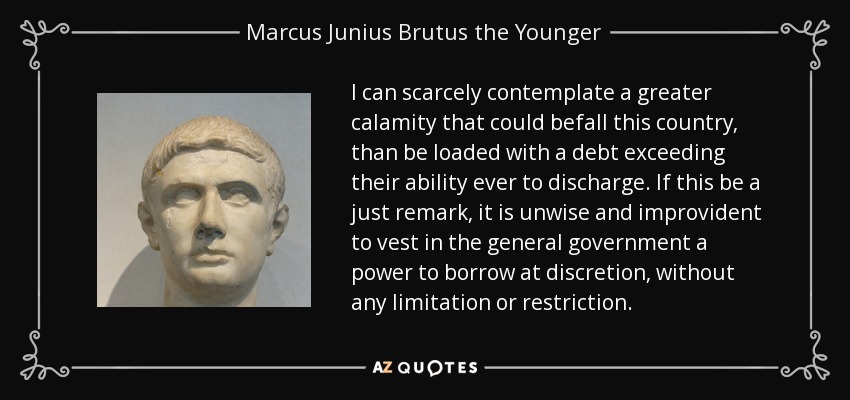
Posted on 04/18/2015 4:20:58 AM PDT by markomalley
Barry Strauss’ The Death of Caesar begins with the triumphant Julius returning to Rome, surrounded by allies and well-wishers—many of whom would eventually take part in the plot to kill him—and then takes the reader on a compelling tour of the events surrounding Caesar’s assassination and the subsequent struggle between competing parties and conceptions of Roman government.
The struggle for power is the heart of this skillful, accessible account. Strauss is keen that we understand just how ruthless the men of Rome were, noting how Brutus had once locked debtor councilmen in their homes until they starved to death. He provides profiles of all the major figures involved in the Ides of March—Brutus, Cassius, and Decimus—but focuses, naturally, on Caesar’s power. He explains how Caesar “replaced republican austerity with imperial pomp and sealed it with a dynasty’s stamp.” In essence, Caesar began the transformation of Rome from a republic back to an effective monarchy—a form of government from which it had long before escaped.
By pursuing his own absolutist authority with such aggressiveness so quickly, Caesar sowed the seeds of his own demise. As Strauss puts it:
In three months, Caesar had disrespected the Senate, dispensed with People’s Tribune, and flirted with monarchy. By February, the conspiracy that would bring Caesar down was being born. In fact, it might already have been alive.
Physical arrogance (the conqueror refused to accept a bodyguard) and poor political calculations were more proximate causes of his death. Strauss explains how Caesar had long cultivated a reputation as a forgiving political master who would grant wealth and prestige in return for absolute loyalty.
But Caesar failed to heed that what he had to offer would not trump the wounded pride of the Roman nobility, members of which determined that Brutus must be at the fore of the plot. Brutus’ family was immensely distinguished, and believed to have been involved in the original transition from monarchy to self-rule. Strauss describes how the “conspirators insisted on him. Their principle was that to kill a king it takes a king—or at least a prince, and Brutus was practically a republican prince.”
Strauss takes pains to give us extraordinary narrative detail about the ferocious assassination itself, working to discard Shakespearean fallacies about what happened that day. Noting that Caesar suffered at least twenty-three independent wounds, Strauss describes how ”the conspirators surrounded Caesar in a circle – again, a sign of careful planning. The blows now came fast and furious. If Caesar was indeed standing, he could not have stayed on his feet for long, probably less than a minute.” Having reviewed the various primary sources, the author concludes that the attack ”almost sounds choreographed, even ritualistic’.’
Strauss then takes us through the weeks of complicated negotiations that followed the dictator’s demise, when the assassins had to surround themselves with gladiators for protection against Caesar’s veterans. With intermediaries like Cicero, a compromise was theoretically reached, but underlying hatreds only grew. The fabric of Rome’s traditional political order began to break down even further. Mark Anthony and Octavian—the man who would become Augustus Caesar—confronted the disparate conspirator armies, the conspiracy’s power ignominiously collapsed. Amnesties were revoked, property was seized, and one by one, the assassins were struck down in battle or by their own hands.
Julius Caesar is declared a God. A new monarchic Rome is built as Octavian pushes Caesar’s old lieutenant Mark Antony aside. Despite their practical failure, Strauss suggests that the assassins may have secured a spiritual victory for the form of government they favored: “[I]f they didn’t save the Republic, they saved republicanism.”
The Death of Caesar manages to be both meticulous and gripping, a noble book about a grim era.
All Caesars must die.
Sic semper tyrannis...

Make no mistake—there are many ambitious people out there just salivating as they dream of seizing the powerful U.S.A. and establishing themselves as the new Caesar. There always have been, but today the possibility is more real than ever before.
Ahhhhh.
Who can forget?
Caesar at the Senate.......handing out salads........
“Eat two, Brutus.”
It is perhaps relevant to note that the author was the Anti-Federalist “Brutus,” not the Brutus of antiquity. Probably Robert Yates.
http://www.constitution.org/afp/brutus00.htm
The problem here is that it it impossible to read the history of the later Republic without realizing that it was committing suicide. It bears much greater resemblance to a government run by Mafia godfathers than to any modern republic.
The politicians used the resources of the State to invade and conquer adjoining countries at their whim, enriched themselves in the process, then used that wealth to gain even greater power over the State.
With the dubious and partial exception of Cicero, it’s not possible to find a leader during this period who seemed to be trying to work for the good of the State and people.
The Republic was collapsing, the logical thing to do with have been to figure out what was necessary to revive it. But all the conspirators could think to do was try to prop it back up for a little while and get what they could before it all fell down.
But I thought it was Cassius who had the lean and hungry look.
But I thought it was Cassius who had the lean and hungry look.
“I come here not to praise Ceasar, but, dang, he sure makes a tasty salad.”
Marc Anthony.
Disclaimer: Opinions posted on Free Republic are those of the individual posters and do not necessarily represent the opinion of Free Republic or its management. All materials posted herein are protected by copyright law and the exemption for fair use of copyrighted works.